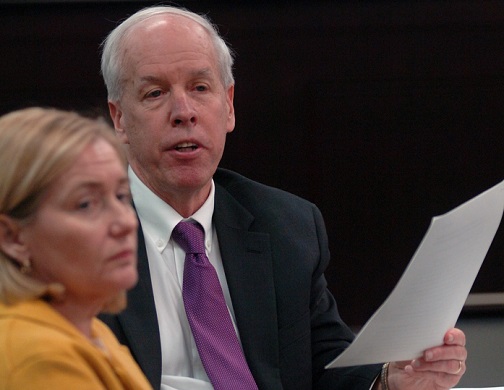FRANKFORT, KY—A bill that would outlaw abortion in Kentucky in most cases if the landmark U.S. Supreme Court ruling in Roe v. Wade is reversed is on its way to the floor of the Kentucky House.

Rep. Joseph M. Fischer, R-Ft. Thomas, and Rep. Nancy Tate, R-Brandenburg, presenting House Bill 148.
The “Human Life Protection Act” or House Bill 148, sponsored by Rep. Joseph M. Fischer, R-Ft. Thomas, and Rep. Nancy Tate, R-Brandenburg, would take effect automatically should the U.S. Supreme Court overturn Roe v. Wade—a landmark 1973 case that legalized abortion nationwide—said Fischer.
“HB 148 would essentially restore the right to life in Kentucky as it existed before Jan. 22, 1973 (the date of the Roe v. Wade ruling),” said Fischer. “(It will) provide full legal protection to every unborn child in Kentucky from the moment of fertilization to childbirth only if the Supreme Court reverses Roe v. Wade or the Constitution is amended to restore authority to any state to prohibit abortion.”
Reversal of Roe v. Wade would trigger the bill, which Fischer said would ban abortion from the earliest stage of pregnancy except when required to save the mother’s life or at times where abortion occurs unintentionally during medical treatment of the mother.
Four states including North Dakota, South Dakota, Mississippi and Louisiana have passed laws similar to HB 148, Fischer added.
While Fischer said he is not aware of any pending U.S. Supreme Court cases that could lead to an overturn of Roe v. Wade, he said having the provisions in HB 148 in place will put Kentucky on “the standby list.”
Rep. McKenzie Cantrell, D-Louisville, said not all of Roe v. Wade may be overturned in any possible reversal by the Supreme Court. She suggested that more oversight be built into HB 148 before it could be triggered.
“(It might be appropriate) to take a look at the opinion to see whether indeed—if the Supreme Court decides to overturn Roe v. Wade—whether indeed it actually did before this law goes into effect,” said Cantrell.
Fischer said hopefully the Supreme Court’s opinion will be clear. “The burden of this bill is on the Supreme Court,” he said.
Opponents to HB 148 testifying before the committee included ACLU Advocacy Director Kate Miller, who said that HB 148 makes no exceptions for victims of rape, incest or domestic violence, no exceptions for in utero birth defects, and would disproportionately affect single mothers and women living in poverty.
Women in poverty are more likely to be victims of domestic violence, which Miller said leads to higher rates of “unintended pregnancy.” Pregnancy, she said, then puts those women “at a higher risk of experiencing violence while they’re pregnant.”
Rep. Stan Lee, R-Lexington, spoke in favor of the legislation and said it will save lives. Lee spoke of the “unalienable rights” outlined in the Declaration of Independence.
“Mr. Chairman, ladies and gentlemen, members of the committee, do you know what the first right listed is? It’s the right to life,” said Lee. He said support is needed for the “unborn life.”
Fischer said some states including New York have passed laws or are considering laws expanding abortion rights in advance of any possible reversal of Roe v. Wade. HB 148, he said, would take Kentucky “the other way.”
“Kentucky has a long and storied history of protecting human life at all stages of development, at least until the (U.S.) Supreme Court removed that authority,” he told the committee.
HB 148 now goes to the full House for consideration.
--END--









